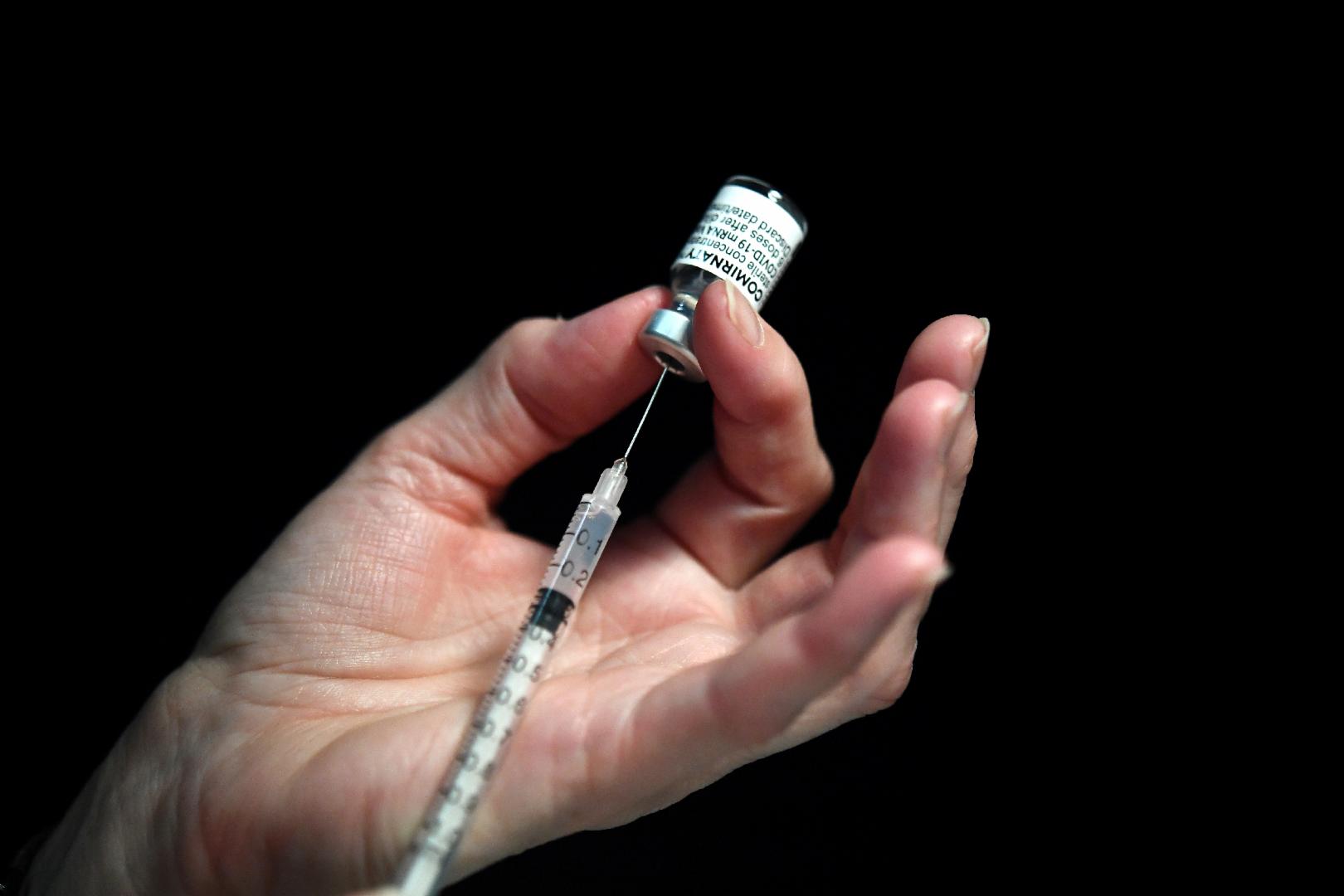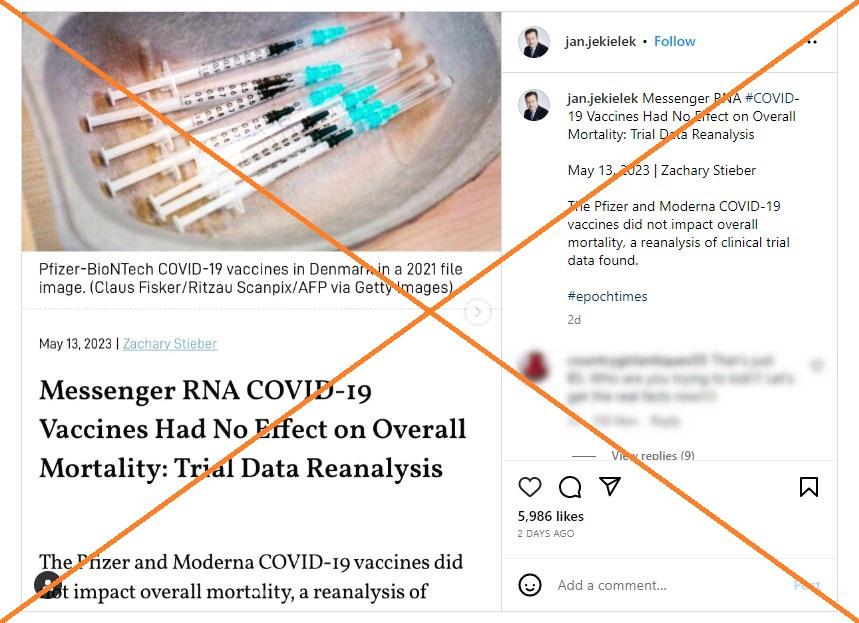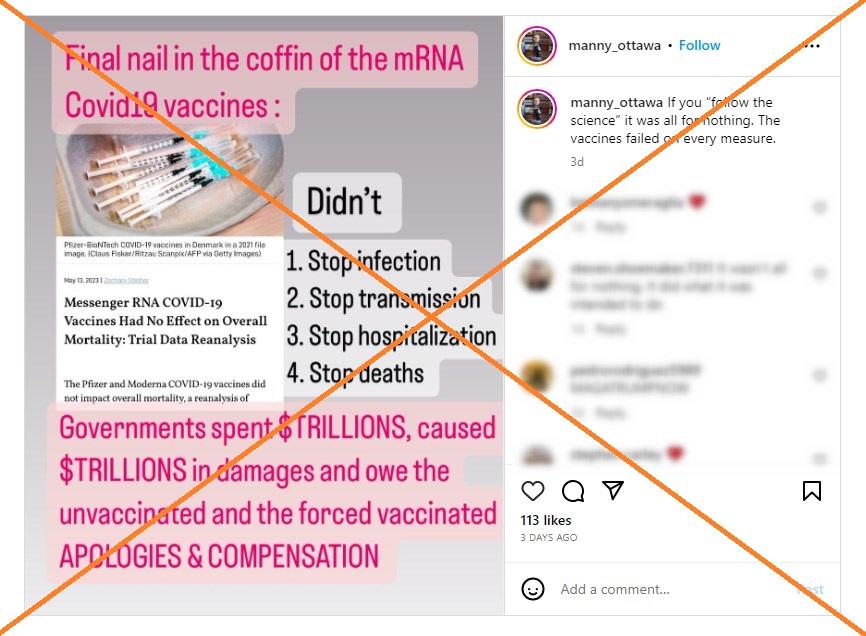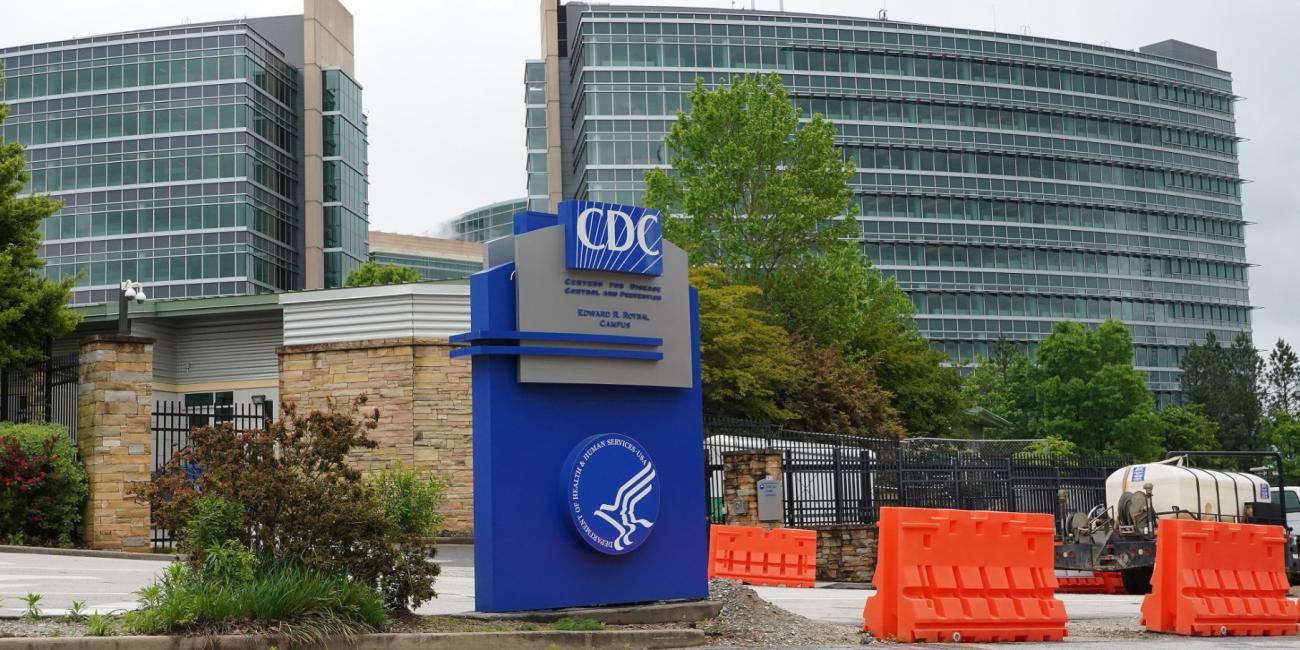
Posts mislead on Covid vaccine efficacy study
- This article is more than two years old.
- Published on May 17, 2023 at 20:45
- 5 min read
- By Daniel FUNKE, AFP USA
Articles and posts circulating on social media claim a study found the coronavirus vaccines from Pfizer and Moderna had "no effect on overall mortality" in clinical trials. This is misleading; the research confirmed the shots prevented Covid-19 fatalities -- its purpose was to analyze potential protection from other causes of death, according to the paper authors and independent experts.
"Messenger RNA COVID-19 Vaccines Had No Effect on Overall Mortality: Trial Data Reanalysis," says the headline of a May 13, 2023 article from the Epoch Times, a website that has previously spread misinformation about the pandemic.
The story accumulated thousands of interactions on Facebook and Twitter, according to CrowdTangle, a social media insights tool. Similar claims circulated on Instagram.
"Final nail in the coffin of the mRNA Covid19 vaccines: Didn't 1. Stop infection, 2. Stop transmission, 3. Stop hospitalization, 4. Stop deaths," says text in a May 14 post.


The posts cite as evidence a Danish study (archived here) published April 24, 2023 in the open-access journal iScience. A preprint version of the paper previously inspired misinformation about the efficacy of Covid-19 vaccines.
The authors analyzed clinical trial data and found the Johnson & Johnson, AstraZeneca and Sputnik V shots were more effective at preventing overall mortality than messenger RNA (mRNA) jabs from Pfizer-BioNTech and Moderna. But the posts shared online give a misleading impression of the research, which looked at how well different vaccines protect against all causes of death -- not just Covid-19.
"The study is being taken out of context," said Amesh Adalja, a senior scholar at the Johns Hopkins University Center for Health Security. "What they are seeing is a non-specific effect on mortality -- above and beyond protection against Covid-19 -- with the adenovirus vector vaccines."
He said in a May 15 email that the paper "is based on a hypothesis that certain vaccines may stimulate immunity and protect against mortality from other causes."
Kate Grusich, a spokesperson for the US Centers and Disease Control and Prevention (CDC), told AFP real-world data indicate the Covid-19 vaccines "provide substantial and durable protection against critical outcomes from Covid-19, including needing to be placed on a ventilator or death."
What the study found
Using clinical trial reports, researchers affiliated with the University of Southern Denmark and other institutions compared the effects of mRNA and viral vector vaccines on five death categories: "Covid-19 mortality," "cardiovascular mortality," "other non-Covid-19 mortality," "accidents" and "non-accident, non-Covid-19 mortality."
They found the viral vector shots may have played a role in "reducing the risk of non-Covid-19 diseases."
The authors said: "The most important cause of non-Covid-19 death was cardiovascular disease, against which the data for the current (randomized control trials) suggest that the adenovirus-vector vaccines provide at least some protection."
Christine Stabell Benn, a global health professor at the University of Southern Denmark and the study's lead author, told AFP the Epoch Times's headline is "somewhat misleading," although the article itself "is a fair representation of our study results."
"Technically speaking, there was an almost equal number of deaths in the mRNA-vaccinated and placebo-vaccinated individuals in the mRNA trials, so one can say that there was no impact on overall mortality," she said in a May 16 email.
However, the research has limitations.
"The study is based only on the clinical trials which had very specific populations. These trials generally had healthy people with a very low risk of mortality," Adalja said. "This is not something that can be extrapolated the way those posts are doing."
The paper authors noted in a May 2022 LinkedIn post (archived here) that population differences in the trials "may have influenced the comparison of mRNA and adenovirus vector effect estimates." The study also says the number of deaths in the trials "was limited, and chance could therefore have played a role in these findings."
The researchers said: "In a real-life situation in which the Covid-19 vaccines are administered to highly vulnerable populations with high Covid-19-related mortality, significant reductions in overall mortality are expected, also for mRNA vaccines."
mRNA vaccines prevent death
Despite the implication of the posts shared online, the paper authors found all the vaccines protected against death due to Covid-19 -- confirming what public health officials have long said about the shots.
The Epoch Times claimed in its article that while the mRNA vaccines "protected against deaths from Covid-19," the effect was "offset by vaccinated trial participants being more likely to die from cardiovascular problems."
AFP has previously fact-checked claims that clinical trial participants were more likely to suffer serious adverse events such as heart attacks than they were to have had serious Covid-19 cases. The allegations hinge on research findings that have not borne out for the general population and contradict much of the available data on the safety of the jabs.
Larry Corey, a professor in the Vaccine and Infectious Disease Division at the Fred Hutchinson Cancer Center, previously told AFP that, "within the context of the (US government)-supported clinical trials on Covid-19 vaccines, we have no evidence of subsequent high rates of hospitalization or cardiac events post-enrollment into these trials."
Meanwhile, Pfizer said in a May 16 statement that there are "numerous real-world analyses demonstrating the effectiveness of Covid-19 vaccines in reducing hospitalization and mortality from Covid-19."
A CDC study analyzing data from 19 US states between February 2022 and January 2023 found the mRNA vaccines were "76 percent effective in preventing Covid-19–associated ventilation and death" among adults with healthy immune systems, according to Grusich. She said that level of protection lasted for "six months after the last original mRNA vaccination dose," dropping to 56 percent at "one to two years after the last dose."
Booster shots provide even more protection; another CDC study examining data between March and July 2022 found two additional mRNA doses were nearly 90 percent effective at preventing death among US nursing home residents.
"People who are up to date have lower risk of severe illness, hospitalization and death from Covid-19 than people who are unvaccinated or who have only received the primary series," the agency says on its website.
The Commonwealth Fund, a private US foundation that aims to improve health care quality, estimated that Covid-19 vaccines prevented 3.2 million additional deaths between December 2020 and November 2022.
AFP reached out to Moderna and the US Food and Drug Administration for comment, but responses were not forthcoming.
AFP has fact-checked other false and misleading claims about vaccines here.
Copyright © AFP 2017-2026. Any commercial use of this content requires a subscription. Click here to find out more.
Is there content that you would like AFP to fact-check? Get in touch.
Contact us




